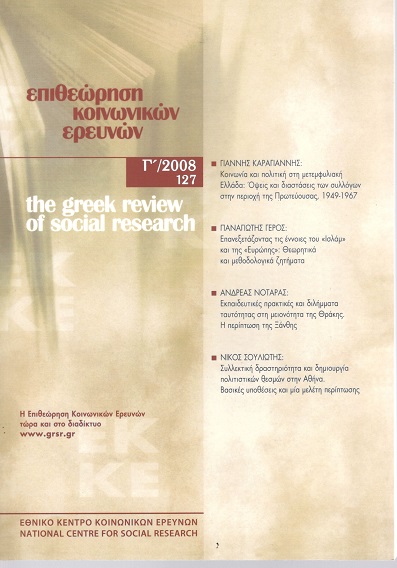Rethinking the categories of "Islam" and "Europe": theoretical and methodological issues
Abstract
The article aims to explore the conceptualization of the relations between "Islam" and "Europe" through recent anthropological and social theory. I argue that the conventional and hegemonic perception of "Islam" in terms of "cultural otherness" is not only characterized by theoretical weakness but is also not capable of dealing, on a directly political level, with current tensions that often take the form of a religious/cultural clash. Instead of approaches that aim to manage the apparent "cultural difference" of Islam, it is suggested that we have to ethnographically and theoretically problematize the fundamental terms in which the difference between the categories of "Islam" and "Europe" is constructed.
Article Details
- How to Cite
-
Γέρος Π. (2016). Rethinking the categories of "Islam" and "Europe": theoretical and methodological issues. The Greek Review of Social Research, 127, 45–72. https://doi.org/10.12681/grsr.9877
- Issue
- 2008: 127 Γ'
- Section
- Articles

This work is licensed under a Creative Commons Attribution-NonCommercial 4.0 International License.
Authors who publish with this journal agree to the following terms:
- Authors retain copyright and grant the journal right of first publication with the work simultaneously licensed under a Creative Commons Attribution Non-Commercial License that allows others to share the work with an acknowledgement of the work's authorship and initial publication in this journal.
- Authors are able to enter into separate, additional contractual arrangements for the non-exclusive distribution of the journal's published version of the work (e.g. post it to an institutional repository or publish it in a book), with an acknowledgement of its initial publication in this journal.
- Authors are permitted and encouraged to post their work online (preferably in institutional repositories or on their website) prior to and during the submission process, as it can lead to productive exchanges, as well as earlier and greater citation of published work (See The Effect of Open Access).



